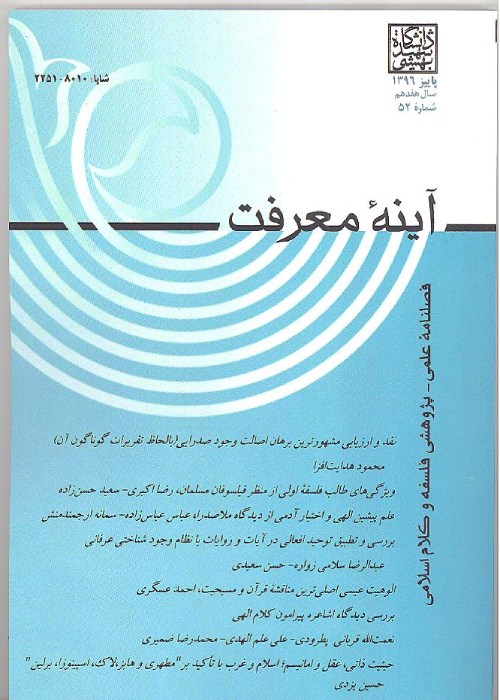The Limits and Quality of Otherworldly Chastisement from Ibn Arabi's Sufistic Perspective
Author(s):
Abstract:
The otherworldly chastisement and its quality and quantity, especially the eternity of hell-fire are among the most important topics of discussion in theology, philosophy and Sufism. Ibn Arabi, as a distinguished scholar in theoretical Sufism, who, in contrast with those devoted to Islamic law and the common religious people, considers divine retribution as non-eternal. With an extra-ordinary approach, he holds that hell-fire has a relative changing state. Ibn Arabi tries to support the idea of the relativity of divine retribution and hell-fire and to show the meagerness of human deeds vis-a-vis God’s grace. He believes in the transformation of divine retribution to divine grace and ultimately to eternal peace. ‘The proportionality of divine retribution to worldly deeds’, ‘the possibility of warnings being refuted by God on the Day of Judgment’ and ‘the non-inherent nature of deeds and the essence of natural disposition’ are reasons put forward by Ibn Arabi to support his view of non-eternity of hell-fire.
Keywords:
divine chastisement , Ibn Arabi , hell , fire , punishment , Sufism
Language:
Persian
Published:
Ayeneh Marefat, Volume:10 Issue: 30, 2012
Page:
163
magiran.com/p1032846
دانلود و مطالعه متن این مقاله با یکی از روشهای زیر امکان پذیر است:
اشتراک شخصی
با عضویت و پرداخت آنلاین حق اشتراک یکساله به مبلغ 1,390,000ريال میتوانید 70 عنوان مطلب دانلود کنید!
اشتراک سازمانی
به کتابخانه دانشگاه یا محل کار خود پیشنهاد کنید تا اشتراک سازمانی این پایگاه را برای دسترسی نامحدود همه کاربران به متن مطالب تهیه نمایند!
توجه!
- حق عضویت دریافتی صرف حمایت از نشریات عضو و نگهداری، تکمیل و توسعه مگیران میشود.
- پرداخت حق اشتراک و دانلود مقالات اجازه بازنشر آن در سایر رسانههای چاپی و دیجیتال را به کاربر نمیدهد.
In order to view content subscription is required
Personal subscription
Subscribe magiran.com for 70 € euros via PayPal and download 70 articles during a year.
Organization subscription
Please contact us to subscribe your university or library for unlimited access!


